A Note to Our Readers:
JwJ 2004–2012
For Sunday June 24, 2012
Lectionary Readings (Revised Common Lectionary, Year B)
1 Samuel 17:1a, 4–11, 19–23, 32–49 or 1 Samuel 17:57–18:5, 10–16 or Job 38:1–11
Psalm 9:9–20 or Psalm 133 or Psalm 107:1–3, 23–32
2 Corinthians 6:1–13
Mark 4:35–41
"I will praise you, O Lord, with all my heart" (Psalm 9:1).
This week brings two important milestones. Here in the Northern Hemisphere, on Wednesday June 20 at 7:09 PM (EDT), we'll observe the summer solstice, the official beginning of summer, and the longest day of the year. Schools are out, vacations are in, and our days begin to get shorter.
Second, this week marks the completion of eight years of Journey with Jesus. We launched our "weekly webzine for the global church" on June 23, 2004. Since then we've served over three million readers in 233 countries and territories — or, more accurately, since every once in a while I get this question, in 233 of the 252 "internet top-level domains."
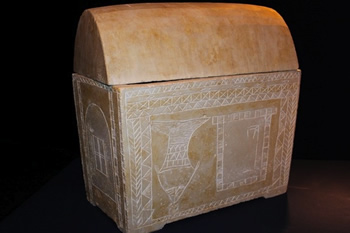 |
Ancient Christian ossuary, perhaps the oldest Christian relic. |
Thanks to our web master Ray Cowan, who in many ways has made JwJ possible. In his day job Ray is a particle physicist for MIT at Stanford. Whereas I write all of our content, except for an occasional guest review and the monthly music reviews by David Werther, Ray manages all things technical. If you have even a little experience at this, you know that's not an easy job. JwJ posts new material every Sunday night, and Ray hasn't missed a single one of those weekly rituals in 416 weeks. Thanks, Ray!
Thanks, too, to our JwJ board, which holds quarterly meetings. Our board remains a source of support, encouragement, wisdom, and provocation.
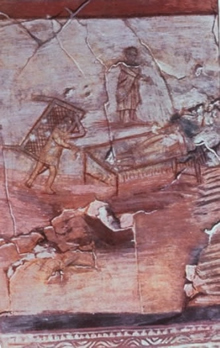 |
Healing of the paralytic, Dura Europos (Syria), third century. |
And thanks to our donors. Their generosity has made JwJ all free, to all readers, all the time. We're also free of all advertisement.
If you go to our drop down menu "About Us" and then click on "Who We Are," you'll discover JwJ's ministry vision. I think of these as six aspects of a Christian world view for the twenty-first century.
My weekly essays follow the Revised Common Lectionary, and so JwJ aims for biblical fidelity. That's not easy. The bible is a mini-library of 66 books, written mainly in Hebrew and Greek by about 40 authors across more than a thousand years. It's long (my bible is 1,635 pages), has many plot twists, and is rooted in ancient cultural settings that are foreign to us today. In this week's reading David beheads Goliath, a classic case of sacred violence. Job 38–41 are a withering divine interrogation of Job that consists of 71 questions for him, like, "Where were you when I laid the foundations of the cosmos?" Despite the complexities of the bible as a human word about God, believers still listen to it for a divine word about humanity.
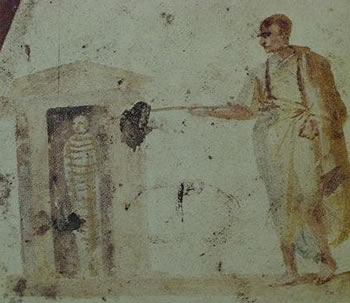 |
Raising of Lazarus, Dura Europos (Syria), third century. |
JwJ also aims for cultural relevance. The issues we face today are different than those of two thousand years ago. We publish not only essays on the lectionary, but also reviews of books, film, music, and poetry. If you go to our comprehensive index of over four hundred book reviews, for example, you'll find some religious titles, but also reviews from a dozen subject categories like art, science, history, and politics. At JwJ I hope the ancient biblical text and the contemporary cultural context collide in an unending conversation.
Real people have honest questions, and so at JwJ no query is off limits. Vibrant faith requires critical inquiry. The readings from Job this week contemplate the problem of evil. The gospel in Mark relates one of Jesus's most famous miracles, the calming of the sea. And what to make of David's sacred violence in 1 Samuel 17? Critical inquiry fosters theological modesty. In the Philokalia St. Peter of Damaskos of the 12th century put it this way: "St. John Chrysostom says that we do not know wholly even what is given in part, but know only a part of a part."
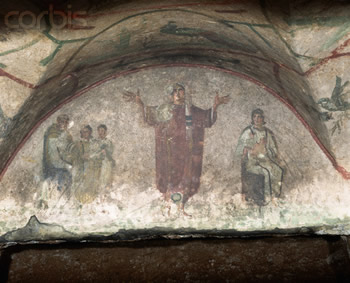 |
Woman at prayer, early fresco. |
A significant portion of JwJ readers are pastors who follow the Revised Common Lectionary and use us for sermon preparation. If you want to gain a new respect for your pastor, just try to write a sermon every week. So, we honor pastors at JwJ. And even though the church "swarms with many faults," as John Calvin once said, we likewise acknowledge the role of the church in the life of faith. I'm Protestant to the core, but I still appreciate the aphorism of Cyprian: "You can't have God as your Father without the Church as your Mother" (which text, by the way, is quoted by Calvin in the opening pages of Book IV of his Institutes).
The church was the world's first truly global institution, and today it's the most globalized institution. Even after eight years, I'm still amazed at JwJ's global reach, thanks to the distributive power of the internet. Last week, for example, readers from 119 countries visited JwJ. And so JwJ encourages a global vision. Since God's kingdom encompasses "every nation, tribe, people, and language" (Revelation 7:9), Christians ought to be geographic, cultural, national and ethnic egalitarians; for us there's no geographic center of the world, but only a constellation of points equidistant from the heart of God. I love how the Epistle to Diognetus (c. 130) captures the consequent tension between Christian confession and geo-political identity. Christians, he says, "dwell in their own countries, but simply as sojourners [or resident aliens]. As citizens, they share in all things with others, and yet endure all things as if foreigners. Every foreign land is to them as their native country, and every land of their birth as a land of strangers."
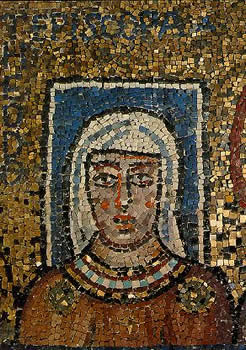 |
Episcopa Theodora, 9th century mosaic in the St. Zeno Chapel of the Church of St. Praxedis in Rome. |
Finally, JwJ celebrates ecumenical generosity. The Spirit of God blows when and where he will. We typically think of Catholic, Orthodox, and Protestant believers, but Christian diversity bursts those simplistic boundaries. Philip Jenkins reminds us of our Syriac cousins in his wonderful book The Lost History of Christianity; The Thousand-Year Golden Age of the Church in the Middle East, Africa, and Asia — and How It Died. And according to David B. Barrett, author of the World Christian Encyclopedia, global Christianity has experienced an explosion of what he calls “neo-apostolic” movements. Distinct from traditional Protestants, and numbering about 400 million Christians in 20,000 “movements,” neo-apostolic believers “reject historical denominationalism and restrictive or overbearing central authority.” Barrett estimates they will constitute 581 million members by the year 2025, 120 million more than all Protestant movements. In two decades these sectarian movements will outnumber Orthodox and Protestant Christians and be almost half the size of worldwide Catholicism.
If you'd like to support JwJ, here are two suggestions. First, sharing our site with your friends is a huge help. Just use the "Email this Page" function. You can enter multiple email addresses with a single request. Second, I'll follow Paul's example in Ephesians 6:19: "Pray for me, that whenever I open my mouth, words may be given me so that I will fearlessly make known the mystery of the gospel."
PS: To support JwJ with a donation, click here. As a 501c3 tax exempt non-profit corporation, in the United States your gift is tax deductible.
Image credits: (1) Discovery.com; (2,3) Squidoo.com; (4) Corbisimages.com; and (5) Wikipedia.org.





